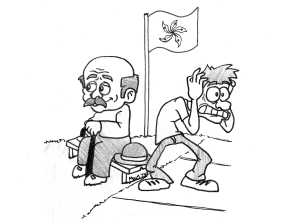 The approximately 50 percent of students at Georgetown who elect to study abroad look forward to many of the same cliches: an abundance of local delicacies, a daily schedule suddenly not measured in carefully planned 15-minute increments and a nightlife no longer dependent on the quality of your fake identification. But when my 16-hour flight to the teeming city of Hong Kong took off in August, all I knew to expect was the unexpected.
The approximately 50 percent of students at Georgetown who elect to study abroad look forward to many of the same cliches: an abundance of local delicacies, a daily schedule suddenly not measured in carefully planned 15-minute increments and a nightlife no longer dependent on the quality of your fake identification. But when my 16-hour flight to the teeming city of Hong Kong took off in August, all I knew to expect was the unexpected.
And in the first weeks, that’s just what I got — typically “unexpected” Chinese fare, awful smells wafting from traditional medicine shops, an unimaginably high concentration of humans and the enduring mystery of why anyone enjoys nibbling the meat off of boiled chicken feet.
Then, in late September, the city awoke to some headlines that were truly unexpected. Hundreds of thousands of Hongkongers took to the streets for weeks to protest a Beijing vetting process that would be imposed on their upcoming election.
A British colony handed back to China in 1997 as a Special Administrative Region, Hong Kong is guaranteed by its constitution a “high level of autonomy” in all matters other than defense and diplomacy. Resentful of any Beijing restriction on their traditional British-Cantonese culture of political openness, freedom of expression and laissez-faire capitalism, many Hong Kong people risked the threat of a crackdown to protest further integration with the mainland.
As images of tear gas and symbolic umbrellas dominated international news coverage, I became more curious about the tensions that define Hong Kong. The city, like much of China, faces a deep generational divide, with deeper conservatism and hesitance toward dissent on the part of the older generation.
Although my university was plastered with black and yellow Umbrella Revolution paraphernalia and saw its common spaces packed with protest rallies, all of our Hong Kong professors — indeed, everyone over 30 with whom I’ve talked — opposed the movement. My political science professor predicted damaging effects on the economy. My middle-aged Mandarin teacher called it reckless and disruptive. Even my idealistic film professor admitted that, while he had attended many protests in the past, this one felt too futile to warrant investment.
Even as protests waned, the age gap became more apparent. At the think tank where I intern, my coworkers called their older boss — a top adviser to the pro-Beijing Chief Executive of Hong Kong — an underground communist. On the other hand, they protested for weeks against that same chief executive from 8 p.m.until 3 a.m. the next day, before running home for a few hours of sleep before work.
In another political realm, fierce anti-Japanese sentiment leftover from World War II continues to rage in much of the elderly Chinese population. But of the younger Hongkongers, about 30 percent elect to learn Japanese in university; Japanese pop culture and tourism opportunities overshadow past military conflicts.
What made this younger generation so different? Why was the older generation so pessimistic about the protest’s prospects? Surely, the same 1989 crackdown on student protesters in Tiananmen Square, which stifled nearly an entire generation’s political dissent, has some effect on those in Hong Kong who are old enough to remember it.
After doing some research, I realized that Hong Kong’s history is actually rich with civil disobedience that rarely appeared on CNN. Protesters filled the streets twice in the 1950s, and a year of pro-Communist rioting left hundreds dead in 1967. An even larger crowd protested the government’s inadequate response to the SARS epidemic in 2003, and thousands take to the streets on June 4 each year to commemorate the Tiananmen Square massacre.
It turns out that generations in Hong Kong differ less on the medium of discontent and more on the content. More than 50 years ago, the British government had its hands full subduing thousands of Communist student protests — but now the student masses are fighting against Communist Party power.
Reflecting so much on China’s age gap, however, almost made me forget the United States’. On a weekend trip to Hanoi, a group of elderly American women approached us in the airport. During the course of our small talk, one of them seemed baffled by my appreciation of Vietnamese culture.
“I find them highly communistic,” she said. “And you know, they actually call it the American War here. As though our soldiers were doing something wrong. But we were right. I’m sorry but I’m too American to think otherwise.”
Despite also calling ourselves American, most of my friends and I disagree with her views on the Vietnam War. But, I bet my 93-year-old Ohioan grandmother would agree with her, and the conversation made me realize that the generation gap does not just create tension in the PRC. It makes me wonder what crazy ideas my future children will deem worth fighting for — or what they’ll dismiss about my own worldview as hopelessly antiquated.
Katy Berk is a junior in the College. She is a former opinion editor of The Hoya.



















